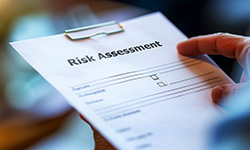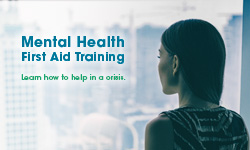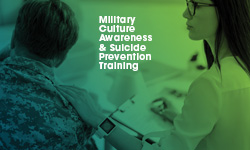Skills Training
Learn More About How to Help in a Crisis
Lines for Life offers various training types to help community members, educators, providers, and others recognize and address signs of crisis in their communities and roles. Basic knowledge and skills are important for everyone to have – you never know when you might need to help someone who is struggling.
Training for Individuals and Groups
If you want to learn more about mental health crisis and suicide prevention, browse the offerings below and find the right training for you.
If you are inquiring about group training on behalf of an organization, please fill out the Training Interest form here.
QPR: Question, Persuade, Refer (English + Español)
Length: 90 Minutes
Format: In-Person, Virtual
Intended for: Everyone
QPR is an evidence-based suicide prevention curriculum that teaches individuals to recognize someone at risk, intervene with confidence and competence and refer them to the appropriate source to receive the help they need.
Learn more about QPR and our statewide network.
See our current trainings and register here / Vea nuestras capacitaciones actuales y regístrese aquí.

Regulate, Relate & Reason: A path for de-escalation
Length: 2-3 hours
Format: In-Person, Virtual
Intended for: Providers, Educators, Community Members
Credit: 2-3 CEUs depending on desired training length
Learn more about de-escalation and how to support someone who may be experiencing a mental health crisis. Content covers signs of crisis, de-escalation skills, and approaching de-escalation from a bio-psycho-social and relational model.

De-Stigmatizing Suicide
Length: 2-3 hours
Format: In-Person, Virtual
Intended for: Providers, Educators, Community Members
Credit: 2-3 CEUs depending on desired training length
Learn to articulate myths and facts about suicide in your community! This training helps you assess your perspective on suicide, bias, and internalized stigma – and leaves you with a plan for how to proactively combat stigma in your community.

Suicide Assessment
Length: 2-3 hours
Format: In-Person, Virtual
Intended for: Providers, Educators, Community Members
Credit: 2-3 CEUs depending on desired training length
Learn how to apply suicide assessment information in your professional setting! This training covers identifying key populations at risk for suicide and examining your personal perspective, bias, and internalized stigma.

Safety Planning
Length: 2-3 hours
Format: In-Person, Virtual
Intended for: Providers, Educators, Community Members
Credit: 2-3 CEUs depending on desired training length
Learn step by step the process of making a safety plan that is individualized, realistic and strengths-based. This training discusses how to assess and prepare for potential barriers to safety planning in your role to support someone in a mental health or suicide crisis to stay safe.

Crisis De-escalation and Suicide Intervention Training
Length: 12 hours
Format: In-Person, Virtual
Intended for: Providers, Educators, Community Members
Credit: 12 hours CEUs
Participants learn to recognize signs of crisis, develop de-escalation skills and strategies for engagement, perform a thorough suicide risk assessment, and effectively collaborate to develop a meaningful plan for safety. This interactive course includes lectures, small group activities, and trainer-led scenario exercises.
Mental Health First Aid (English + Español)
Length: 8 hours
Format: In-Person, Virtual
Intended for: Providers, Educators, Community Members
Credit: Approved for credit through NASW, MHACBO, and AMH
This interactive eight-hour community education program teaches participants how to identify, understand, and respond to indicators of mental illness and substance abuse. Mental Health First Aid participants will challenge conventional stereotypes regarding mental illness, reframing myths into positive action and compassionate understanding.
This Mental Health First Aid course simulates a variety of different mental health crises an individual may encounter. Through sample role-play scenarios and interactive dialogue, participants will learn how to approach and support someone experiencing a mental health crisis.
Specifically, trainees learn, practice, and implement a five-step action plan called ALGEE:
- Assess for risk of suicide or harm
- Listen non-judgmentally
- Give reassurance and information
- Encourage appropriate professional help
- Encourage self-help and other support strategies
After training, participants have reported:
- greater confidence in offering help to others
- reduction in stigmatization attitudes
- improved personal mental health
Learn more about Mental Health First Aid.
See our current trainings and register here / Vea nuestras capacitaciones actuales y regístrese aquí.
ASIST: Applied Suicide Intervention Skills Training
Length: 16 hours over 2 days
Format: In-Person
Intended for: Providers, Educators, Call Counselors, Community Members
Credit: 12.0 NASW CEs for Social Workers, LPCs; alcohol and drug prevention and treatment providers receive MHACBO credit.
This two-day intensive, interactive workshop provides participants with the skills and practice to assist in suicide intervention. The class is composed of lectures, small group discussions, and interactive exercises. ASIST also includes demonstrations and role-playing of common suicide intervention situations, allowing participants to practice their newly learned suicide intervention skills in a supportive environment.
The techniques and skills you’ll gain through ASIST transcend cultural and international barriers. With over one million participants worldwide, graduates feel ready and confident to help others after completing ASIST training.
Upon completion of the workshop, participants will be prepared to:
- recognize invitations for help
- reach out and offer support
- assess risk of suicide
- apply evidence-based suicide intervention model
- link people with community resources
Military Culture Awareness & Suicide Prevention (MCASP) Training
Length: 14 hours over 2 days
Format: Virtual
Intended for: Medical & Behavioral Health Providers
Credit: up to 12 NASW CEUs™
Learn about Veteran and Military-specific language and other cultural cues necessary to bridge the gap between providers and Veterans who seek care. Gain access to specific suicide prevention and intervention assessments and in-depth knowledge and skills to improve your familiarity with Veteran, service members, and military family needs around mental health and suicide.
Didn’t find what you’re looking for?
Contact us to inquire about additional training opportunities.



